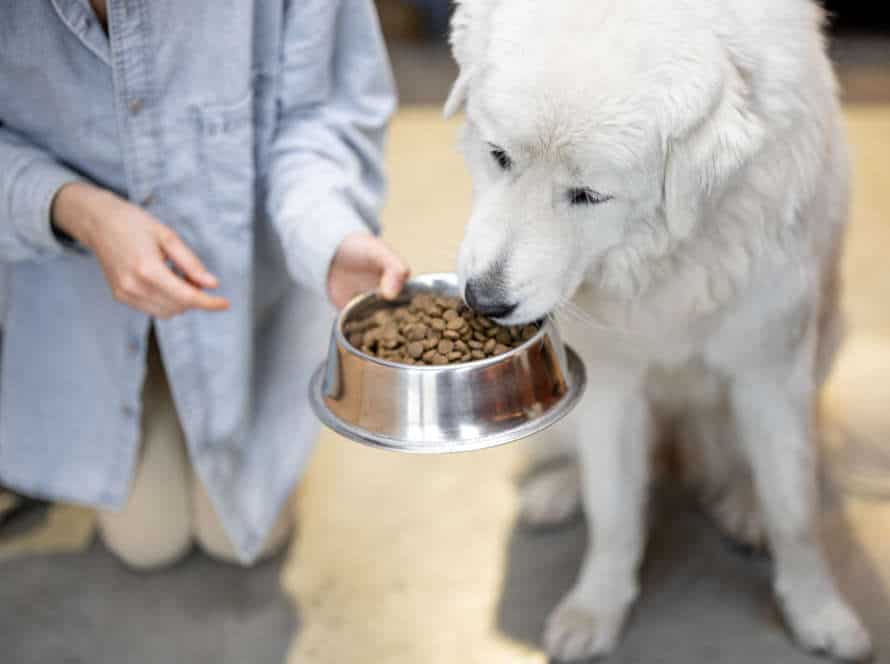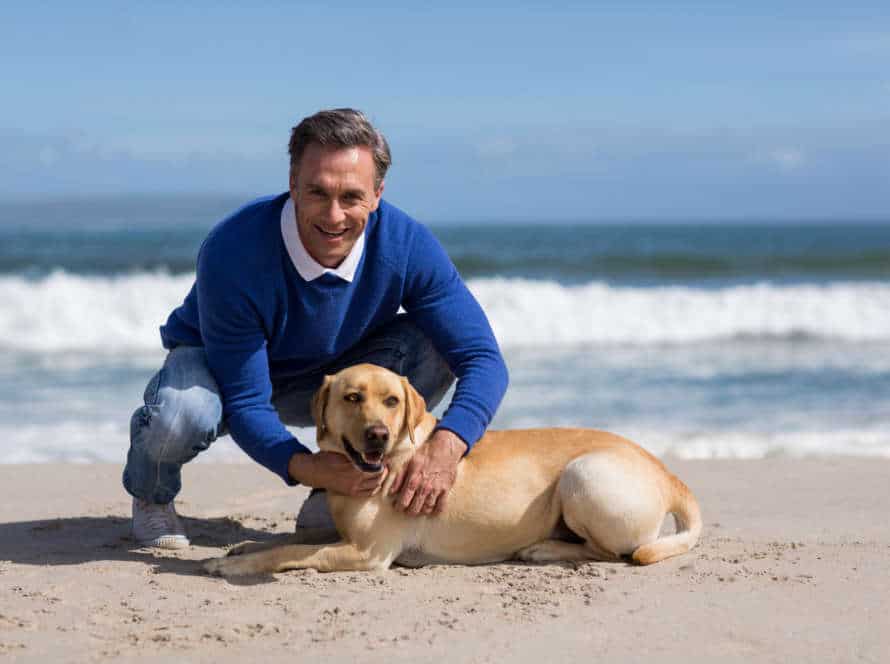What and How to Feed Your Growing Puppy
Nourishment is essential for your pup’s healthy growth. Here are some tips on what and how to feed them:
Types of food: Buy quality commercial doggie food suited to your pup’s dietary needs. Look for food formulas based on size and age for the right nutrient balance.
Feeding frequency: Puppies need more feedings than grown-up dogs. As a rule of thumb, feed your puppy 3-4 times a day until 6 months old. Then two meals a day.
Portion size: Follow the instructions on the food label for the correct amount. Monitor your pup’s weight and adjust portion size accordingly.
Treats: Treats should not make up more than 10% of their daily calories. Buy treats made for puppies and avoid anything toxic, such as chocolate, grapes, and onions.
Water: Offer your pup fresh and clean water always.
Pro Tip: Check with your vet to establish the right feeding routine for your pup.
Understanding Your Puppy’s Nutritional Needs
Puppy feeding? It’s important! Make sure your pet gets the nutrition they need for growth and development. Get to know your pup’s nutritional needs. It’s key to a healthy diet. Here we discuss the basics of puppy nutrition, and the best way to make sure they get the proper nutrients to thrive.
Macronutrients Your Puppy Needs (Protein, Carbohydrates, Fats)
A pup that’s growing needs a balanced diet. It should have 3 main macronutrients: protein, carbs, and fat. Protein helps build and repair muscles, maintain skin and coat, and give the immune system a boost. Examples include: meat, fish, poultry, and eggs.
Carbs are important for energy, digestion, and brain growth. Sources include: rice, sweet potato, fruit, and veg.
Fat helps keep skin and coat healthy, and aids brain and nervous system development. Good sources are: salmon oil, chicken fat, and flaxseed.
It’s a must to give your pup quality food that has the right amount of macronutrients for its age, breed, and activity level. Ask your vet for advice on what and how much to feed it.
Micronutrients Your Puppy Needs (Vitamins, Minerals)
Your puppy needs micronutrients for their growth and development. They provide the building blocks for healthy bones, joints, muscles, and organs.
Calcium is key for strong bones and teeth, and also helps with muscle and nerve function.
Vitamin D works with calcium and promotes bone growth. It also regulates the immune system.
Iron creates red blood cells that transport oxygen and supports healthy growth.
Zinc is necessary for wound healing, immune function, and protein synthesis.
Vitamin A helps vision, skin, and the immune system.
A balanced diet with these essential micronutrients is important for your puppy’s health. Ask your vet or an animal nutritionist for advice on the right food.
Importance of Feeding Your Puppy a Balanced Diet
Feeding your pup a balanced diet is essential. It gives them nutrients to stay healthy, full of energy and well.
Puppies need a mix of protein, carbs, fats, vitamins and minerals. These help with growth, muscle development and the immune system.
When picking puppy food, choose good quality ingredients that are easy for them to digest. And get ones suitable for their age, breed and activity levels.
Follow these tips to feed your pup:
- Stick to a routine, don’t give too many treats or human food.
- Once they reach full size, start to transition them to adult food.
- Consult your vet for specific recommendations on your pup’s health and nutrition.
Choosing the Right Type of Puppy Food
Selecting the correct kind of puppy food for your pup’s growth is essential for their health. Puppies require different sustenance than adults, so it is important to give them the right food that will aid their development. This section will explore what types of puppy food you should give your pup and how to feed them best.
Dry Kibble vs. Wet Food
Picking between dry kibble and wet food can be intimidating for puppy owners. Both have advantages and disadvantages. Deciding which one to feed your pup depends on a few factors. Here are some to think about:
- Age: Wet food is simpler to chew and digest. So, it’s better for puppies under 6 months. Dry kibble works for older pups with grown-up teeth.
- Nutrition: Both types of food fulfil your puppy’s diet. But, wet food has more moisture, which helps keep your pup hydrated.
- Convenience: Dry kibble is simpler to store and serve. Wet food needs refrigeration and goes bad quickly.
- Palatability: Puppies have different tastebuds. Some may like wet food more, others prefer kibble’s crunchy texture.
In the end, the choice depends on your puppy’s needs and likes. Talk to a vet to decide what’s best for your pup.
Pro Tip: Get a good quality, balanced diet for your pup – wet or dry.
Understanding Different Types of Puppy Food (Growth, All Life Stages, Senior)
When it comes to feeding your pup, there are several options.
- Growth puppy food: For puppies under 1 year, high protein and nutrients for growth and development.
- All Life Stages food: Suitable for all ages and sizes, good for multi-dog households or large breeds.
- Senior puppy food: For older pups, fewer calories and added supplements to support health.
Choose the right one based on your pup’s needs.
Pro tip: Ask your vet for advice.
How to Read Pet Food Labels
Reading pet food labels is must-do when picking the perfect pup food. Here are some tips to help you understand what is on a label.
- Check the ingredients list: The first few ingredients should be high-quality proteins, like chicken or lamb. And, no fillers like corn or soy.
- Look for AAFCO statement: The Association of American Feed Control Officials (AAFCO) needs a statement on pet food labels. This statement should show if the food meets the minimum nutritional standards for pets.
- Check the guaranteed analysis: This section gives the nutrient content and percentages; protein, fat, fiber, and moisture level.
- Check the feeding guidelines: The label should give feeding guidelines based on your dog’s weight and age.
- Avoid generic terms: Label terms such as meat meal, by-products, animal digest, and meat-and-bone meal, usually are not useful to know what kind of meat is in it.
Remember that different dogs have different dietary needs. It’s best to talk to your vet to create a personalized feeding plan.
Feeding Your Puppy
It’s key to give your pup the best nourishment and love! Pups need nutrients and energy for their development, so it’s essential to give them the right food and in the right amount. In this article, let’s chat about what and how to nourish your growing pup.
How Often to Feed Your Puppy
Feeding your pup is essential for their growth. So, how often and what should you feed them?
Puppies need smaller, more frequent meals than grown-up dogs. Usually, 3-4 small meals spread throughout the day work best for puppies.
Choose high-quality puppy food for them. It should be full of protein, vitamins and minerals. Don’t give your puppy table scraps or human food. This can cause nutrient imbalances and digestion issues.
Look at the food packaging to see the recommended portion size for your puppy. When they reach 6 months, switch to feeding them twice a day.
Keep in mind: a nutritious and balanced diet is essential for the puppy’s growth and development.
Portion Control for Your Puppy’s Age and Size
Portion control is key when feeding your pup. This ensures they get all the nutrients they need, while avoiding any health risks from overfeeding. Here are a few guidelines based on age and size:
- Age: Young pups need more meals with smaller portions. As they age, reduce the number of feedings, and increase portion size.
- Size: Smaller puppies need smaller portions. A good rule is 1/4 to 1/2 a cup of food per three to five pounds.
But always consider your pup’s individual needs. Talk to your vet to find out the right portion size for age and size.
Avoiding Common Feeding Mistakes (Table Scraps, Overfeeding, Inappropriate Foods)
It’s your job to feed your pup. To make sure they stay fit, avoid these common feeding mistakes:
- Stay away from table scraps. They make your puppy sick and lead to long-term health problems.
- Don’t overfeed them. It can give them obesity and other health concerns. Follow your vet’s advice and adjust as needed.
- Be aware of the foods to avoid. Chocolate, grapes, onions, and garlic are toxic for pups. Keep them out of reach.
To keep your pup healthy and growing well, avoid these mistakes. Pro Tip: Ask your vet for help to pick the right diet for your pup’s age, breed, and activity level.
Special Considerations for Feeding Your Puppy
Nourishing your puppy in the right way is fundamental to make sure he matures strong and healthy. A balanced diet is important for maintaining your pup’s health and cheerfulness. When it comes to feeding your puppy, there are some particular aspects to remember. In this section, we will discuss what and how to give food to your growing pup.
Food and Water Bowls
When picking bowls for your pup, it’s essential to get the right ones for their health. Here are things to think about:
- Material: Use non-toxic, tough, and non-slip substances such as ceramic, stainless steel, or BPA-free plastic.
- Size: Get a bowl size that fits your pup’s breed and age. The bowl should be deep enough to hold enough food and water without spilling out.
- Design: Go for designs that are easy to clean. Don’t go for bowls with detailed patterns or textures that can trap food bits and create bacteria.
- Location: Put the bowls in a spot that’s peaceful and easy to access, away from high-traffic areas. The bowls should be at least one foot apart for perfect digestion.
Remember to clean your puppy’s food and water bowls after every meal to stop bacterial growth and probable illness. Tip: Ask your vet for help to decide the best diet for your pup.
Treats and Supplements for Puppies
Nourishing your pup correctly with treats and supplements is very important for their health and growth. As a puppy parent, you must be aware of their nutritional needs and decide wisely what and how much to give them.
Treats:
Get treats specifically made for puppies and made with top-notch ingredients. Don’t give human food or any other treats that have a lot of fat, sugar, or salt. Treats should make up only 10% of their daily calorie intake.
Supplements:
Your pup’s diet should contain all the essential vitamins and minerals. However, sometimes supplements can help with their wellbeing. Speak to your vet before you give your pup supplements to guarantee they are safe and effective. Common supplements for puppies include probiotics, omega-3 fatty acids, and joint supplements.
Pro tip: Always give your pup fresh water and make sure they have access to it all the time. Don’t free-feed and stick to a regular feeding plan to form healthy eating habits.
Dietary Restrictions (Allergies, Intolerances, Sensitivities)
When feeding your puppy, take into account any dietary restrictions they may have. Here are some tips:
- Note any symptoms when introducing new food.
- Ask a vet or nutritionist to make sure your pup is getting enough nutrition.
- Look for puppy food tailored to their dietary needs.
- For allergies/sensitivities, use single-ingredient food or hypoallergenic formulas.
- Introduce new food slowly, over 7-10 days, to avoid digestive issues.
- Give your pup plenty of clean water.
A nourishing diet will help your pup grow up healthy and strong.
FAQs About Feeding Puppies
Puppies grow quickly. They need special nutrition for a healthy, balanced development. It’s hard to know what to feed them and how much. To help, we’ve gathered some of the most popular questions about puppy feeding. This section will discuss the best way to feed your puppy.
When to Switch from Puppy Food to Adult Food
Puppies grow fast and their nutrition needs change with age. Knowing when to switch from puppy food to adult food is key for their health and development. Here’s when it’s time:
- Age: Usually 12 months or when they reach full size.
- Weight: Bigger breeds may need extended puppy food, smaller breeds adapt quicker.
- Activity Level: If your pup is active, he’ll need more calories for energy.
- Health Issues: If your pup has any issues, like obesity, a food switch may be needed.
Make the transition gradually by mixing adult food with puppy food over days.
Pro Tip: Consult your vet to determine when and which food is best for your pup’s breed and health.
Safe Human Foods for Puppies to Eat
As a pet-parent, it’s important to know which human foods are safe for your pup. Here are some that are perfect for a balanced diet:
- Cooked chicken, beef, or turkey without seasoning – high protein and easy to digest.
- Cooked veggies such as carrots, peas, and green beans – packed with vitamins and minerals.
- Plain cooked rice, pasta, or potatoes – good source of carbohydrates.
- Apples, bananas, strawberries, and blueberries – full of fiber and antioxidants.
When feeding your pup human food, avoid fatty and high-sugar foods. This can lead to digestive issues like vomiting and diarrhea.
It’s best to have a chat with your veterinarian. This will help create a balanced diet plan for your pup.
How to Choose the Right Puppy Food Brand for Your Pup.
Picking the ideal puppy food brand is key for your pup’s health and growth. Here are some FAQs to assist you with feeding your pup:
- Q: What type of food should I offer my pup?
A: Feed your pup a full, balanced puppy food that meets their development needs. It should be made specifically for puppies and say so on the label. - Q: Should I feed dry or wet food to my puppy?
A: Both can work. Dry food is often more practical, cheaper, and better for teeth, while wet food is tastier and can help with hydration. - Q: What ingredients should I look for in puppy food?
A: High-quality protein, healthy fats, fruits, and veg are all important. Avoid added preservatives, colors, and flavors, as well as fillers like corn, wheat, and soy. - Q: How much should I give my puppy?
A: It depends on their age, breed, size, and activity level. Refer to the feeding guidelines on the food package or ask your vet.
Pro tip: Switch from one brand to another gradually to prevent tummy upset.
Frequently Asked Questions
1. What should I feed my growing puppy?
It is best to feed your growing puppy with high-quality, dry dog food that is specially formulated for puppies. Look for a brand that has a high protein content and is free from fillers, artificial preservatives, and colorings. You may also incorporate wet food or fresh, lean meats, and vegetables under your veterinarian’s recommendation.
2. How much food should I give to my growing puppy?
The amount of food that you should give to your growing puppy depends on their age, weight, and breed. Generally, puppies below six months of age should be fed three to four times a day, while those over six months should be fed twice daily. Follow the feeding guidelines on the dog food label and monitor their weight and overall health to adjust accordingly.
3. Can I give table scraps to my growing puppy?
No, you should not give table scraps to your growing puppy. Human food, especially processed and high-fat food, may not provide the necessary nutrients that your puppy requires and may even lead to health problems such as obesity, digestive issues, and pancreatitis.
4. When should I switch to adult dog food?
You should switch to adult dog food when your puppy reaches their full-grown size and no longer needs the added nutrients in puppy food. This usually happens at around 12 months of age for most small and medium-sized dogs and up to 24 months for larger breeds. Consult with your veterinarian for advice on when to switch to adult dog food.
5. Can I give my growing puppy treats?
Yes, you can give your growing puppy treats, but in moderation. Treats should not exceed 10% of your puppy’s daily calorie intake, and it is best to choose treats that are low in calories, such as training treats or carrot sticks. Avoid giving your puppy chocolate, raisins, grapes, onions, and other harmful human foods.
6. Should I feed my puppy supplements?
The need for supplements for growing puppies may vary depending on their diet and overall health. However, most high-quality puppy food already contains the necessary vitamins and minerals that your puppy needs. Consult with your veterinarian before giving any supplements to your growing puppy.







